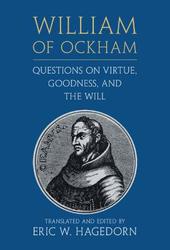
|
William of Ockham: Questions on Virtue, Goodness, and the Will
Hardback
Main Details
Description
William of Ockham (d. 1347) was among the most influential and the most notorious thinkers of the late Middle Ages. In the twenty-seven questions translated in this volume, most never before published in English, he considers a host of theological and philosophical issues, including the nature of virtue and vice, the relationship between the intellect and the will, the scope of human freedom, the possibility of God's creating a better world, the role of love and hatred in practical reasoning, whether God could command someone to do wrong, and more. In answering these questions, Ockham critically engages with the ethical thought of such predecessors as Aristotle, Augustine, Thomas Aquinas, and John Duns Scotus. Students and scholars of both philosophy and historical theology will appreciate the accessible translations and ample explanatory notes on the text.
Author Biography
Eric W. Hagedorn is Associate Professor of Philosophy at St. Norbert College, Wisconsin. He has published a number of articles and book reviews on medieval philosophy of mind, language, and logic in journals including Oxford Studies in Medieval Philosophy and Notre Dame Philosophical Reviews.
Reviews'There is solid value in this volume: hard reasoning about ethics from a master of tough thinking and a form of philosophy that works an idea from its ontological range to its casuistic range. These are set within a doctrine, nominalism, that had profound effects on all manner of intellectual conception and cultural production in the Renaissance. All this is collected here from sources that are very long and thorny into an exemplary compendium for ethics, logic, and philosophical method.' Bennett Gilbert, Metascience
|